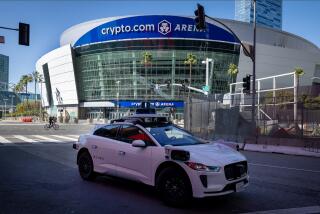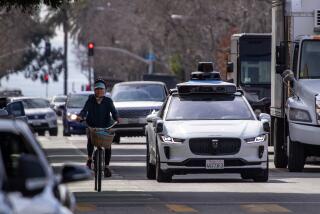Uber gets big win in Nevada as Legislature OKs bill authorizing service
Forty-six states down, four to go.
After a dicey, too-close-to-call battle with state regulators and the taxicab industry, Uber emerged victorious in Nevada this week when the state Legislature voted to allow it and similar on-demand transportation companies to operate there.
For the record:
6:59 p.m. April 18, 2024This article misstates the name of lobbyist John Griffin as Jack Griffin and of Washoe County District Court Judge Scott N. Freeman as Scott N. Freedman.
If Gov. Brian Sandoval signs off as expected, Uber, Lyft and other ride-hailing companies could begin competing with taxis and limos in Las Vegas and across Nevada as soon as July 1.
Once that happens, there will be only four states in which Uber doesn’t operate, all with low populations and no big cities: South Dakota, Wyoming, West Virginia and Alaska.
“This is a pretty big deal,” said Thilo Koslowski, vice president and automotive practice leader of research firm Gartner. “This is a state used to having a strong taxi lobby. ... It was not going to be a slam-dunk.” Getting into Nevada, he said, “kind of validates the business model Uber has.”
In less than five years since its launch, San Francisco-based Uber has gone from running a niche luxury town-car service to offering a personal-driver service for every budget. You can hail an Uber vehicle in more than 150 U.S. cities and 55 countries.
Ask Uber about its key to success, and it will say it is simply responding to consumer demand, that this is a service that the people have wanted all along.
“When you’re able to respond to unmet needs, you can tap into incredible market potential,” said Uber’s head of North American public policy, Justin Kintz. “That’s clearly been the reason for Uber’s success since Day One.”
Another reason: Uber’s aggressive approach to overcoming state and city regulations covering taxis and limousines that would dig into its potential profits, such as requirements for commercial car insurance.
The company has a “punch approach” to new markets, Koslowski said.
“They punch themselves into the market, break glass, upset people and then figure out how to bring everybody together in a more friendly way,” Koslowski said. “That, to me, is what’s special about Uber. They go into markets first, then they try to figure out how to deal with potential critics.”
That’s the way it went in Nevada.
Last October, Bruce Breslow greeted two Uber representatives in his Las Vegas office. He’s head of the state’s Department of Business and Industry, which includes taxi regulation.
“I suggested that they could apply with the [Nevada Transportation Authority] to be a common carrier,” which regulates limousines, Breslow said. Or, “they could apply to be a taxicab company with the Taxicab Authority.”
The pair said thank you and walked out.
Two days later, Uber began offering rides. Breslow heard about it in an email that announced, “Your Uber is arriving now, Las Vegas!”
Nevada punched back. The Las Vegas papers reported that 10 Uber cars were impounded. The state sued Uber. In November, a judge issued a preliminary injunction banning Uber from Nevada.
The trial itself, though, revealed just how popular taxi alternatives such as Uber have become. A recent poll of Las Vegas residents showed that 75% supported Uber. One of the advocates is Breslow, the guy whose office enforces taxi regulations. He’s a big fan of the ride-hailing company.
“I’m a client,” Breslow said from the stand. “I commend them for great public relations, great technology.” On a family trip to New York City recently, “I put the Uber app on my mom’s phone so she could use Uber in the future.”
The attorney representing Uber couldn’t contain his amusement. “I would like to say thank you,” he told Breslow. “I don’t get an opportunity to examine an adverse witness whose first words on the stand is that my client has a sensational product.”
Washoe County District Court Judge Scott N. Freedman, even as he banned Uber, kept the lovefest going. “There’s no question it’s a wonderful product,” he said. “But I’m charged with following the law.”
Meanwhile, Uber set its headlights on the statehouse. In most places, cities regulate taxicabs. In Nevada it’s the state.
Unable to operate under court order, Uber hired high-profile Nevada lobbyist Jack Griffin to lead its effort. Griffin lobbies for companies including DirecTV, Dish Network, Sprint, Zappos.com and Amazon.com.
He would be going up against the mighty Las Vegas taxi industry, which hired two former Nevada governors to lobby on its behalf.
Las Vegas is the most touristy tourist town in the U.S. The local population is 603,000, but the city attracts 41 million visitors a year.
On the Las Vegas Strip, taxis are as ubiquitous as they are in midtown Manhattan. The airport has a taxi queue that’s a logistical marvel. In March this year, there were 2.5 million cab rides in Nevada, according to state regulators, most in Las Vegas.
In an economy based on casino gambling, money talks. Since 1990, the taxi industry in Nevada has given $3 million to local and statewide political campaigns, according to data from the National Institute on Money in State Politics.
Bills to allow Uber to operate were introduced in March.
Lobbyists from both sides wooed legislators or tried to shock them. Pro-Uber lobbyists talked up innovation and noted a survey by the Las Vegas Global Economic Alliance that showed 75% of Southern Nevadans want Uber. Taxi lobbyists ran news clips about an Uber driver who killed a 6-year-old girl in a San Francisco crosswalk to make the case for strict, taxi-style regulation.
It looked like Uber was going to lose. Then came one big sweetener: an excise tax of 3% applied to all cars for hire — Uber, Lyft, taxis, limos, everyone. That would bring in $19 million toward a new medical school at the University of Nevada and then some.
Nevada state Sen. Debbie Smith (D-Reno) originally voted against Uber because, she said, revenue projections came from lobbyists, not the Legislature’s fiscal staff.
“When we asked for the weekend to have our staff vet the numbers, the majority leader refused, so I felt at that point I had no choice but to vote no. Then on Monday our staff confirmed the projections that were close enough for my comfort level to be able to vote yes.”
Several taxi drivers, interviewed by The Times before the vote, said they thought that Uber’s entry into the market was inevitable.
As Ernesto Valdavia, an immigrant from Nicaragua, put it: “They’ll get in.... America is based on the free enterprise system.”
Twitter: @traceylien







